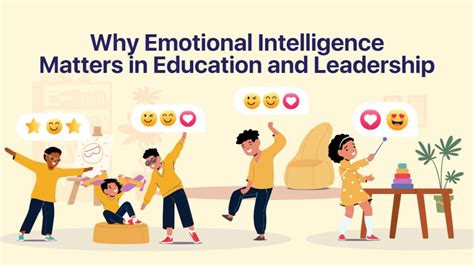Why Emotional Intelligence Matters in Education

In an era where academic achievement is often measured by standardized test scores and grades, the importance of emotional intelligence (EI) in education is increasingly being recognized. While cognitive skills like reading, writing, and math are critical to student success, emotional intelligence plays an equally vital role in helping students develop the necessary skills to navigate the complexities of both their academic and personal lives. Understanding and cultivating emotional intelligence in educational settings can lead to improved academic performance, better mental health, and more effective interpersonal relationships. But why exactly does emotional intelligence matter in education? Let’s explore the key reasons.
What is Emotional Intelligence?
Emotional intelligence refers to the ability to recognize, understand, manage, and influence one’s own emotions and the emotions of others. It involves five core competencies:
- Self-awareness: Recognizing and understanding one's own emotions.
- Self-regulation: The ability to control or redirect disruptive emotions and impulses.
- Motivation: Harnessing emotions to pursue goals with energy and persistence.
- Empathy: Understanding the emotions of others and showing compassion.
- Social skills: Managing relationships, inspiring others, and resolving conflicts.
These skills are not just relevant to adults in the workplace but also play a crucial role in the development of young people as they face the challenges of school life and growing up.
Enhances Academic Performance
Research has shown that students with higher emotional intelligence tend to perform better academically. This is because EI helps students manage the stress and emotional demands of school, which can otherwise hinder learning. For instance, a student who can regulate their anxiety before a test is more likely to perform well than one who becomes overwhelmed by stress.
Moreover, emotional intelligence fosters motivation and perseverance. Students with high EI are better equipped to set goals, stay focused, and bounce back from setbacks—qualities that are essential for academic success. Instead of giving up after facing difficulties, these students are more likely to seek solutions, improve their strategies, and continue to push toward their academic goals.
Supports Mental and Emotional Well-being
Education is not just about academic content but also about personal development. The emotional challenges that students face—ranging from social pressures and bullying to stress and mental health issues—can interfere with their learning. Emotional intelligence can help students navigate these emotional hurdles more effectively.
For instance, self-awareness helps students identify when they are feeling stressed, anxious, or sad, allowing them to seek help before these emotions escalate. Self-regulation teaches students how to manage their emotional responses in challenging situations, preventing outbursts or negative behaviors that can affect their well-being. Additionally, students with high EI are more likely to engage in positive coping strategies, such as talking to a trusted friend, practicing mindfulness, or seeking support from counselors.
Fostering emotional intelligence in students can also have a long-term impact on their mental health. By equipping them with the tools to understand and regulate their emotions, schools can help reduce rates of depression, anxiety, and other mental health issues among students.
Improves Social Skills and Interpersonal Relationships
A significant part of a student's school experience involves interacting with peers, teachers, and family members. Emotional intelligence plays a crucial role in shaping how students build and maintain these relationships. Empathy, for example, enables students to understand the feelings and perspectives of others, which helps them develop strong, supportive friendships.
Students with strong social skills can communicate more effectively, collaborate with others, and resolve conflicts constructively. In the classroom, this translates into better teamwork, less bullying, and more harmonious interactions between students. Teachers also benefit from emotional intelligence as it enables them to connect with their students on a deeper level, fostering a positive learning environment where students feel heard and respected.
Moreover, emotional intelligence helps students navigate social dynamics, whether they are part of a group project or participating in extracurricular activities. The ability to understand and manage emotions is essential for creating an inclusive school culture where diversity of thought, background, and personality is celebrated.
Prepares Students for Future Success
In today’s world, the ability to collaborate, communicate, and solve problems together is more important than ever. These "soft skills" are central to emotional intelligence and are essential in the modern workplace. In fact, studies have shown that emotional intelligence is a better predictor of workplace success than IQ or technical skills alone.
By fostering emotional intelligence in students, schools are equipping them with the competencies they need to succeed not just in their academic lives, but in their future careers and personal lives. Whether students pursue careers in healthcare, technology, business, or the arts, the ability to empathize, collaborate, manage emotions, and communicate effectively will set them apart as leaders and innovators in their respective fields.
Builds a Positive School Culture
A school that prioritizes emotional intelligence fosters a positive, inclusive, and supportive environment for both students and staff. When teachers and administrators model emotional intelligence, students are more likely to mirror these behaviors, creating a culture of empathy, respect, and cooperation.
Programs that focus on SEL (Social and Emotional Learning) have been proven to reduce behavioral problems, improve attendance, and enhance overall academic achievement. By creating a school culture where emotional intelligence is valued and practiced, educators are not only enhancing students' academic abilities but also teaching them how to be compassionate, responsible, and emotionally healthy individuals.